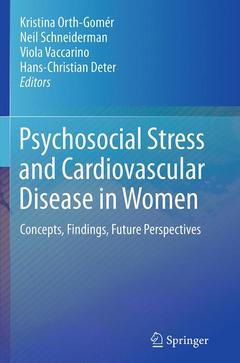Psychosocial Stress and Cardiovascular Disease in Women, 2015 Concepts, Findings, Future Perspectives
Coordonnateurs : Orth-Gomér Kristina, Schneiderman Neil, Vaccarino Viola, Deter Hans-Christian

Not long ago, it was assumed that coronary heart disease mainly--or only--affected men. Now that CHD is recognized as a leading killer of women as well as men, numerous research studies have been made of its diverse presentations in women, causal factors, and possibilities for prevention and treatment.
The expert contributions to Psychosocial Stress and Cardiovascular Disease in Women span the results of this cross-disciplinary awareness. This progressive resource takes a three-dimensional approach to its subject, focusing on epidemiology and risk factors for heart disease in women, the psycho- and neurobiology of stress and coronary disease, and promising clinical interventions. Chapters identify and analyze multiple intersections of social, biological, and psychological factors in affecting women's heart health, from the social dimensions of depression to genetic/environmental interactions to the demands of balancing work and family. These wide-ranging findings will assist and motivate professionals in choosing and creating interventions, developing appropriate prevention strategies, and reducing gender-based disparities in health care. Among the topics covered:
- Enhancing women's heart health: a global perspective.
- Coronary heart disease in women: evolution of our knowledge.
- Gender observations on basic physiological stress mechanisms in men and women.
- Sleep as a means of recovery and restitution in women.
- LifeSkills training: benefiting both genders, for different reasons.
- Gender considerations in psychosocial-behavioral interventions for coronary heart disease.
In particular this book will be helpful for cardiologists and other clinicians who may ask themselves why patients do not seem to make rational choices. "Why do patients not follow the advice they are offered?" is a common complaint. The role of psychosocial stress for patient compliance and adherence can be traced throughout the volume. It is emphasized in the chapters on psychosocial interventions along with other tangible and conceptual suggestions and experiences with psychosocial stress and life style change. Psychosocial Stress and Cardiovascular Disease in Women offers a deep practical level of understanding of this epidemic to help expand the work of health and clinical psychologists, sociologists, cardiologists, primary care physicians, and epidemiologists.
Epidemiology and Risk Factors.- Prevalence and incidence of cardiovascular disease in women: psychosocial stress, morbidity, and mortality.- Socioeconomic status and women’s health: development over the life span.- Women’s health, work and family life.- Early stress experience: psychosocial risk factors in women with special reference to PTSD.- Mechanisms and Psychobiological Pathways.- Basic psychophysiological stress mechanisms: cortisol and catecholamines.- Female endogenous hormones: the menopausal transition and women’s health.- Psychoneuroimmunological pathways in women.- Psychobiological mechanisms in women.- Neurobiological and genetic pathways in women.- Recovery and restitution: sleep quality and reparatory functions in women.- Pst-traumatic stress disorder: early impact on brain function and psychobiological pathways in women.- Breathing patterns and blood pressure regulation in women.- Interventions to Reduce Women’s Stress and Improve Health.- Evaluation of randomized clinical trials in women’s health: impact, methods, and criteria.- Life skills for women: cognitive processes and communicative skills in randomized clinical trials.- Cognitive programs, dynamic concepts: interpersonal interactions in women’s clinical trials.- Successful intervention modalities for female patients: experiences from practical implementation of a cognitive program in different groups of women.- Conclusions from 20 years of research on women’s cardiovascular health: tracking the chain of events.- Summary and Concluding Remarks.
Date de parution : 08-2016
Ouvrage de 305 p.
15.5x23.5 cm
Disponible chez l'éditeur (délai d'approvisionnement : 15 jours).
Prix indicatif 105,49 €
Ajouter au panierDate de parution : 12-2014
Ouvrage de 305 p.
15.5x23.5 cm



